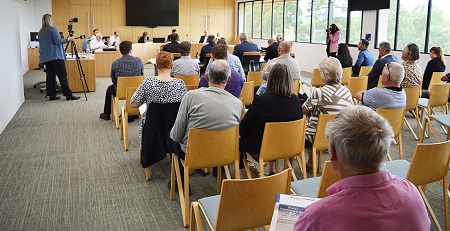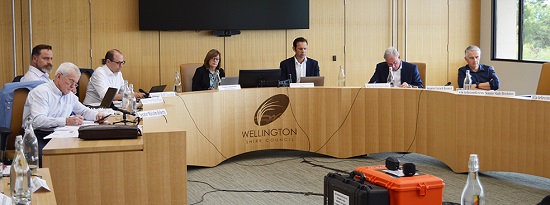The first hearing of the Senate Rural and Regional Affairs and Transport Inquiry into Bank closures in regional Australia was a smashing success, which sets the stage for the rest of the inquiry.
The hearing was held in Sale, Victoria, a town of 15,000 people in Gippsland which was recently informed they would lose their Westpac bank. The local federal MP, Darren Chester, who gave a fiery speech in Parliament in February comparing the banks to “crooks wearing balaclavas” for stealing jobs and services from country towns, lobbied the Committee to rapidly convene a hearing in his town, even before all submissions have been received.
Crucially, the hearing was attended by Senators from all political parties, including Greens and One Nation, and all of the Senators were united in their task of holding the banks accountable. The Australian Citizens Party attended as observers, represented by Robert Barwick and Glen Isherwood; independent journalist Dale Webster also attended.
Sounds awful out loud
The hearing opened with questioning of representatives from Westpac first, followed by NAB. Initially assigned half an hour for each bank, the questioning went past an hour each, and for good reason. While the representatives from NAB talked as though they had ice in their veins, and seemed incapable of shame, Westpac’s head of retail, Ross Miller, appeared extremely uncomfortable, as if he knew that what sounded good around the Westpac executive board room, in terms of cutting costs to boost profits and bonuses, sounded awful when said out loud in front of the communities impacted by the decisions and Senators intent on holding the banks to account.
LNP Senator and inquiry chairman Matt Canavan landed the first blow of the hearing by asking Westpac how it had consulted with the town of Sale regarding its planned branch closure. Ross Miller thought it was a good time to proudly observe that Westpac had paused the Sale branch closure, but Senator Canavan would not be placated. He made Miller reveal that Westpac only notified the local Council it was closing the Sale branch after making the decision. Senator Canavan pounced, noting that meant Westpac had not “consulted” at all.
Closed banks aren’t unprofitable
Senator Rennick extracted the admission from both Westpac and NAB that when they decide to close branches, it is not because the branches are unprofitable. This is very significant, since the banks want most people to assume that as they are making commercial decisions, they must be closing branches that are losing money. Unfortunately, they met their match in Senator Rennick, who is a former Treasury Accountant at the Bank of Queensland and knows how bank accounting works. Both banks admitted the profitability of the branch is not the reason for closing the branch, but tried to make excuses that the decision is made based on serving customers “where they are”, which both claimed is online.
Blackspot, greyspot hotspot
After the banks, the rest of the day took testimony from three local Councils and community business organisations. Their testimony immediately contradicted the claims of the banks that everyone is moving online. All the witnesses were unapologetic that their communities need banks and cash, and deserve full face-to face banking services. The East Gippsland Shire Council representatives made the dramatic point that their shire is the “blackspot and greyspot hotspot” of Australia, meaning they have huge swathes of territory with either no mobile and internet coverage (blackspot) or very slow coverage (greyspot). The claim that their communities are rushing online is ludicrous. The Finance Sector Union gave very powerful testimony that the banks are putting staff under excruciating pressure to force customers to register for online banking. FSU representative Wendy Street revealed how one bank doesn’t allow its employees to mark on customers records if the customer has previously declined to register for online banking, so that it doesn’t matter how many times the customer has said “no”, they are always asked again. Ms Street called it “harassment”. The FSU’s testimony told a very different story to Australian Banking Association CEO Anna Bligh’s ad nauseam claim that customers are choosing to bank online, and the banks are following them (p. 6).
ACP and postal bank
Senator Malcolm Roberts made an issue of the postal bank solution all day, asking every witness in turn, including the banks, their view of the policy. The banks declined to comment, but many of the Council and business group representatives endorsed it. The Senator twice cited ACP National Secretary Craig Isherwood’s 2015 speech, “The Australian Precedents for a Hamiltonian Credit System”, identifying Craig as the author both times, and ended the proceedings with a recommendation to witnesses who want more information on the postal bank solution: “Talk to Robbie Barwick and the Citizens Party—they’ve done all the work.”
By Robert Barwick, Australian Alert Service, 8 March 2023








